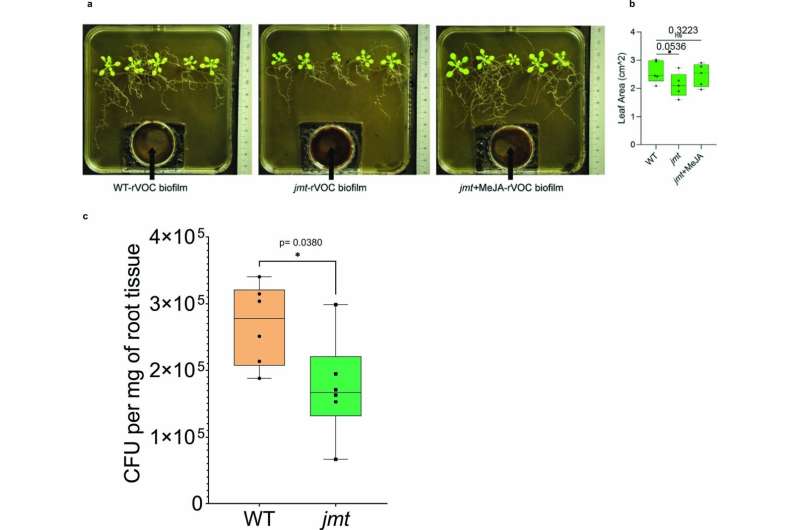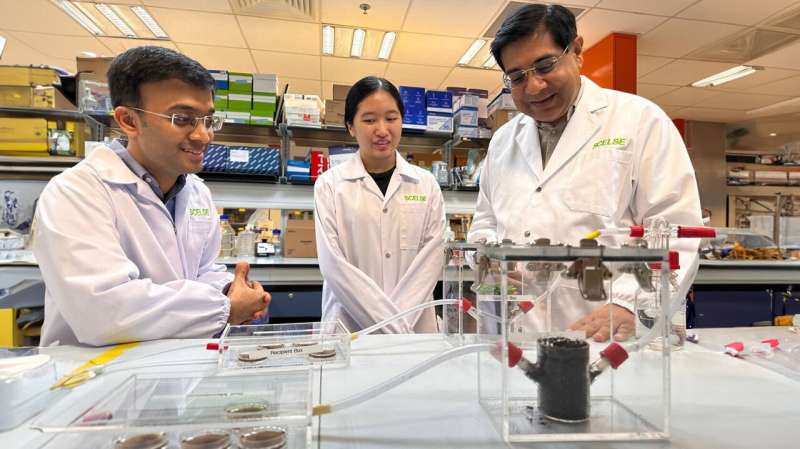This article has been reviewed according to Science X's editorial process and policies. Editors have highlighted the following attributes while ensuring the content's credibility:
fact-checked
peer-reviewed publication
trusted source
proofread
Scientists discover plant hormone that boosts growth by 30%

Scientists from NUS and the Singapore Center for Environmental Life Sciences Engineering (SCELSE) have uncovered one of nature's most potent tools in an arsenal to combat today's agricultural challenges: agro-microbials—or agro-chemicals of natural origin—that can enhance the synergy between crops and microbes, and ultimately improve crop yield and productivity.
In a five-year study that began in 2018, the scientists discovered that a well-known protective hormone typically released by plants above ground during periods of stress—a volatile organic compound (VOC) known as methyl jasmonate (MeJA)—possessed a hitherto unknown function. They found that MeJa served as a shared, possibly secret, language that allows a plant to communicate with the surrounding layers of microorganisms embedded in the soil.
The research team has made three important discoveries:
- Using a specially engineered airflow system, scientists have found, for the first time, that MeJA is released underground by the plant roots in a volatile form;
- The presence of volatile MeJA triggers and enhances the formation of biofilms in bacteria situated at a distance from the plant roots; and
- These bacteria in the biofilm release a different set of volatile compounds that can boost plant growth by up to 30%.
The findings were detailed in the paper titled "Volatile methyl jasmonate from roots signals the formation of host-beneficial biofilms by the soil microbiome," which was published in the journal Nature Chemical Biology on 13 November 2023.
Associate Professor Sanjay Swarup, who is a Principal Investigator at the Research Center on Sustainable Urban Farming (SUrF) under the NUS Faculty of Science and a Deputy Research Director at SCELSE, said, "The impact of this discovery is manifold and key to sustainable agriculture. Harnessing these agricultural microbes will not only boost crop productivity, but also reduce the need for synthetic inputs and mitigate the environmental impact of modern farming practices."
Having discovered nature's own way of communication between plants and beneficial microbes, the research team has filed a patent for the use of this novel application to enhance it to improve the resilience and productivity of agricultural systems. The upshot of this could be a new generation of agro-chemicals or nature-structured chemicals which can be used to enhance the benefits for plants.
Agro-microbials can influence plant growth and address food security
As the world population is projected to reach 10 billion by 2050, ensuring food security for its inhabitants has become one of the most pressing challenges of this century. Singapore, for example, has set a "30 x 30" goal—to be able to produce 30% of our nutritional needs by 2030.
To achieve these goals, agricultural productivity must urgently grapple with the effects of climate change, land degradation, and increasingly unpredictable weather events. Agro-microbials—and nature-based agrochemicals—are now emerging as a promising strategy for sustainable agriculture.
Agro-microbials encompass microbial communities associated with crops, and they serve critical functions of plant growth promotion, disease prevention, and nitrogen fixation. They also help to keep the soil fertile by breaking down organic matter, recycling nutrients, and creating humus to retain moisture. Diverse communities of agro-microbials can be found inside biofilms, where they are embedded in a self-produced matrix.

The 'fragrance' emitted by plant roots causes a positive, cascading effect
Fragrant MeJA VOC can impact microbes from a distance. This highlights the fact that the signal can extend beyond the plant's immediate rhizosphere (the niche surrounding plant roots where soluble and volatile molecules facilitate the communication between plants and the associated microbiota).
The paper's joint first author, Dr. Omkar Kulkarni, who is now a research scientist at L'Oréal-SCELSE joint laboratory, said, "Plants can't talk like us, but they have their elegant ways of conversing over long distances. This exciting discovery will not only bring fundamental insights about plant-microbe interactions but also potentially pave the way for nature-based agrochemicals." Dr. Kulkarni conducted this research as part of his Ph.D. work at the Department of Biological Sciences of the NUS Faculty of Science.
Dr. Mrinmoy Mazumder, an NUS research fellow at SCELSE and joint first author of the paper, added, "VOC-mediated communication between plants and microbes in the rhizosphere spans the distance, orchestrating nature's harmonious collaboration. This discovery holds fundamental and translational significance for the scientific community, offering opportunities to delve into mechanistic insights and develop tailored solutions for stress management in diverse crop varieties."
More information: Omkar S. Kulkarni et al, Volatile methyl jasmonate from roots triggers host-beneficial soil microbiome biofilms, Nature Chemical Biology (2023). DOI: 10.1038/s41589-023-01462-8
Journal information: Nature Chemical Biology
Provided by National University of Singapore





















